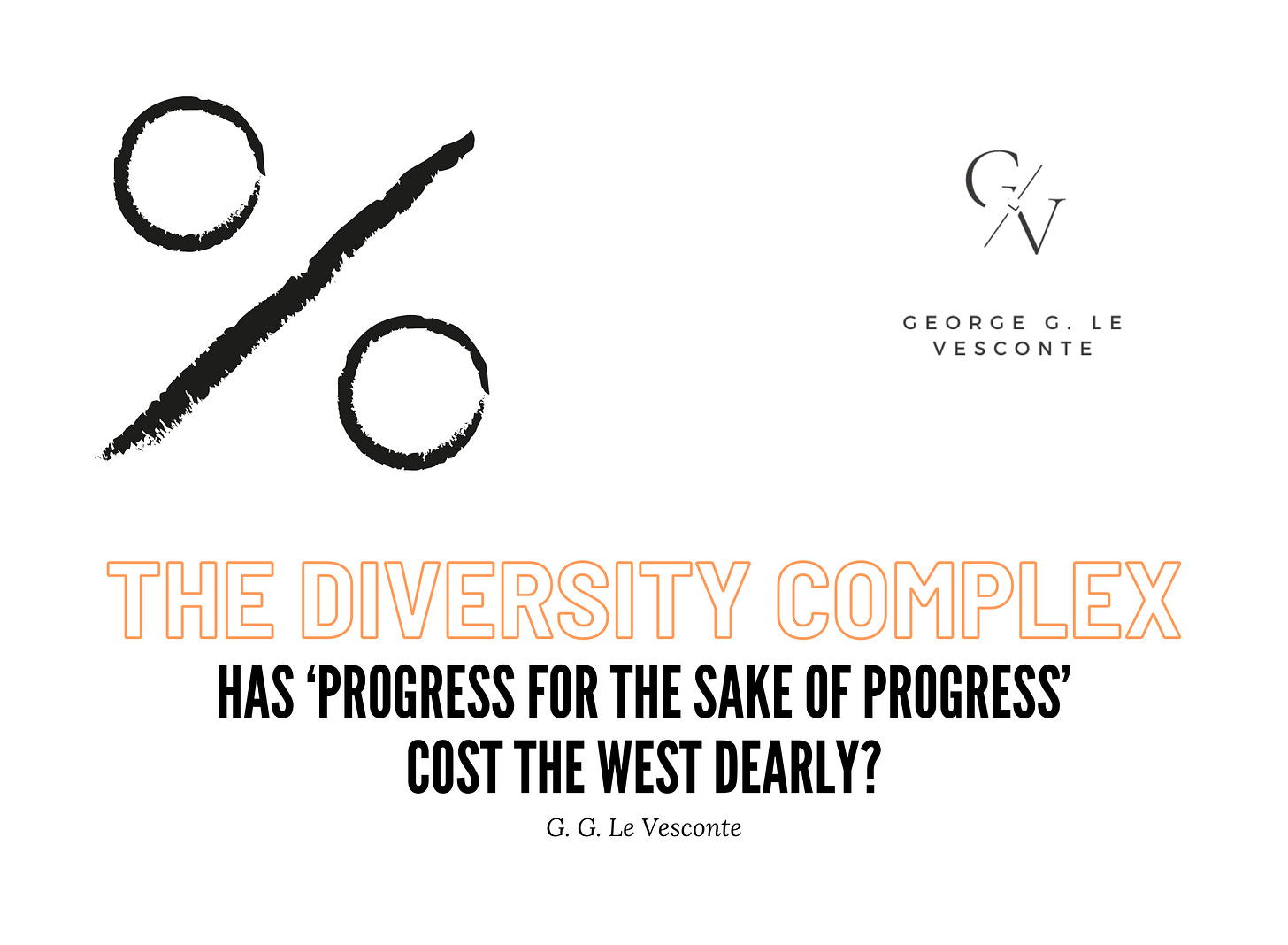My Growing Concern with The Diversity Complex
In theory, diversity, equity, and inclusion (DEI) benefits society, but does it come at the cost of rationality, respect, and harmony?
Many people in the West refer to the ‘complexity of diversity’ these days. They discuss the complexities of incorporating every aspect of diversity into daily life and put emphasis on its importance.
Now, don’t get me wrong, diversity is important; however, it’s worth noting that it is a naturally occurring microcosm of modern Western societies. And, while it is good to emphasise inclusivity towards all members of the population, I think it’s equally as important to establish a line over which complaining minorities should not cross.
What I think we have in the West is a ‘diversity complex’, through which we over-egg the pudding, as it were, putting a little bit too much emphasis on what society ‘should’ and ‘shouldn’t’ do. With a degree of critical thought, much of what is spouted today would quickly be deleted before being published, and I think this would encourage a more pleasant, harmonious, and, generally speaking, commonsensical discourse.
A recent case in point: A prominent neurodiversity speaker—female, white—shared her excitement about the programme A Kind of Spark, a show about three sisters, two of which are neurodivergent, featuring neurodivergent actors, written by a neurodivergent author, winning Best Children’s Show at the Broadcast Awards.
While I don’t usually jump into these niches, it’s impressive. It’s a great sign of progression in Western society. We’ve seen, across the past few years, a proliferation in diagnoses of autism, ADHD, etc., in adults, highlighting a great failure of both the education and medical systems ability to identify strugglesome problems in young people. While this award doesn’t fix that, it does, at least, bring the normality of neurodivergence to the forefront—indicating that things are changing.
YAY!
But, with social media being the vitriolic medium that it is, the comments on this highly engaged post were, to say the least, divided. What bothered me, though, was the top, most-liked comment and its subsequent thread.
‘How is there a show in 2024 with only white women in the lead roles? They even have almost identical hairstyles. (Sad face)’
To which somebody—looking for some virtue-signalling brownie points—responded:
‘Thanks for bringing this up! There is still a long way to go…’
The original commenter came back with the following:
‘I don’t know you and cannot judge your level of sincerity, but respectfully, that statement is a complete copout. We are way past the point where an all-white leading cast is even remotely justifiable. It’s honestly embarrassing.’
A man who works in the neurodivergence space pointed out that the programme is based on the book about the three sisters and that it’s a progression away from highlighting only male neurodivergence. He had quite a lot of likes but was ignored in the comments. Instead, a couple more people chimed in.
A specific comment that stood out:
‘I’m so incredibly frustrated by the neurodivergent community (most of it!) reproducing exclusion by *literally* hyper-focusing on white experiences of neurodivergence. We have to include intentionally, or we are excluding minorities within minorities!’
Goodness. These types of ad hominem responses on a post that’s celebrating a great success for the neurodivergent community as a whole are, well, repugnant. Should the efforts of the team behind this programme—the original author, the neurodiverse actors, and the story itself—not be respected? And if not, can it truly be acceptable to not celebrate this award-winning project only because of the actors’ complexion—or, indeed, their natural hair?
If the boot was on the other foot, would it be acceptable for white commentators to show such disdain and negativity towards an ethnically diverse cast? I needn’t answer that question, of course; you already know the answer.
And so, my question, after reading this post on social media, is a simple one: Why is it okay to dampen the achievement of young neurodiverse actors—and, indeed, people as a whole—based purely on the fact that they are white?
Addendum:
Discussing this with a close friend, I made a reference to what the lead protagonists and antagonists of Harry Potter would look like if it were filmed in 2024. Harry, Hermione, and Ron would definitely not be as they were, and Draco Malfoy would undoubtedly remain the very same. But that brief recollection reminded me of a quote from another antagonist, Dolores Umbridge. She was particularly unpleasant, and, let’s be honest, nobody in the real world liked her. A ‘Karen’, I think, is how she would be incorrectly described today. But one of her quotes was significant:
‘Progress for the sake of progress must be discouraged.’
Think about that for a second.
It’s true, isn’t it? Especially in the modern world. In recent years, we have pushed for progression on all fronts in the West, whether it be innovations in technology, climate, DEI, or anything else you can think of.
But are we happier? I don’t think we are; instead, we are more divided. There are those ‘with’ and those ‘without’, and we appear to be regressing on a societal level with increasingly fierce tribal politics and what George Orwell called ‘Groupthink’ in 1984.


